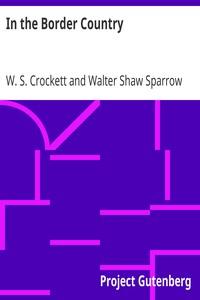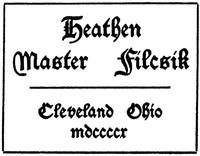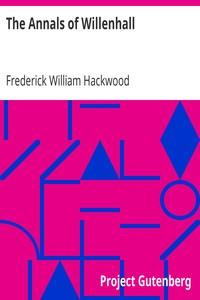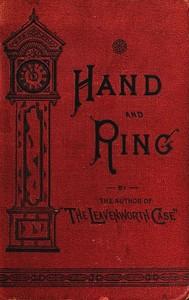Read this ebook for free! No credit card needed, absolutely nothing to pay.
Words: 30479 in 9 pages
This is an ebook sharing website. You can read the uploaded ebooks for free here. No credit cards needed, nothing to pay. If you want to own a digital copy of the ebook, or want to read offline with your favorite ebook-reader, then you can choose to buy and download the ebook.


: In the Border Country by Crockett W S William Shillinglaw Sparrow Walter Shaw Editor Orrock James Illustrator - Great Britain Description and travel
he original shrine by the beautiful bend of the Tweed, a mile or two down the river from the second and more celebrated Melrose. Here Eata, "a man much revered and meek;" and Boisil, who gave his name to the neighbouring St. Boswells; and Cuthbert, the most illustrious of them all, served God with gladness. Of the latter, certainly the most conspicuous Borderer of his day, something more must be said. Three kingdoms claim his birthplace. The Irish Life of the Saint alleges him to be sprung of her own blood royal; he is affirmed also to have come of noble Northumbrian descent; whilst the Scottish tradition makes him the child of humble parents, born and reared in Lauderdale, one of the sweetest valleys of the Border. It is a fact, at any rate, that when the light of record first falls upon him the youthful Cuthbert is seen as a shepherd lad by the Leader; he is religiously inclined, and whilst his comrades sleep, he spends whole nights in prayer and meditation. One day he hears voices from out the unseen calling to him. Another night it is a vision of angels that he fancies he beholds bearing the soul of the sainted Aidan to the skies. Such was Cuthbert, a kind of mystic, a dreamer of strange dreams, destined apostle and Bishop, and next to Augustine himself the most illustrious figure in the annals of English monasticism. The church of Channelkirk dedicated to the Saint, probably indicates his birth-spot. The Leader valley is full of legends of his boyhood, the whole west of Berwickshire, indeed, being haunted ground for Cuthbert's sake. Other great names in the history of early Border Christianity are those of Benedict Biscop, the founder of the monasteries of Jarrow and Monk Wearmouth; Wilfrid, the founder of Hexham; and the Venerable Bede--the "father of English learning"--whose "Church History of the English People" is the greatest of the forty-five works that bear his name.
PLATE 4
HOLY ISLAND CASTLE:
HARVEST-TIME
FROM A WATER-COLOUR SKETCH
PAINTED BY
BORDER WARFARE
It was doubtless due to the exigencies occasioned by those frequently recurring wars and raids from the 13th to the 16th century that the whole country on both sides of the frontier became so thickly studded with castles and peel-towers, the numerous ruins of which still form a distinctive feature in Border scenery, although from times much earlier the castles and strongholds were characteristic elements in the old Scottish landscape. Alexander Hume, of Polwarth, the poet-preacher of Logie, near Stirling, in his fine description of a "Summer's Day," thus refers to them:--
"The rayons of the sunne we see Diminish in their strength; The shade of everie tower and tree, Extended is in length. Great is the calm for everie quhair The wind is settlin' downe; The reik thrawes right up in the air, From everie tower and towne."
Generally these towers were planted on heights overlooking the river-valleys, and, as a rule, within sight of one another, in order that the signals of invasion or alarm--flashed by means of the bale fire--might be the more rapidly spread from point to point. Very few of them are now entire--the best-preserved on the Scottish side being, perhaps, Barns, at the entrance to the Manor valley; Bemersyde, still inhabited; and Oakwood on the Ettrick, incorporated in the present farm buildings; and on the English side, Corbridge and Doddington and Whittingham. From a return made in 1460 we find that Northumberland alone possessed 37 castles and 78 towers, and the Scottish side was equally well strengthened and defended. Amongst the larger and more important fortresses on the English side were the Castles of Alnwick, Bothal, Carlisle, Cockermouth, Coupland, Dilston, Elsdon, Etal, Ford, Naworth, Norham, Prudhoe, Wark, Warkworth; and on the Scottish side, Berwick, Branxholme, Caerlaverock , Cessford, Ferniherst, Hermitage, Hume, Jedburgh, Neidpath, Peebles, Roxburgh, Threave, Traquair, besides, as has been said, hundreds of peel and bastle-houses scattered all over the country.
It would be a quite impossible task to chronicle the incessant clan-raids of the Border, and to narrate all the invasions that took place on either side would be to repeat in great measure the general history of England and Scotland. But at least two authentic reports, covering little more than a year, may be quoted as showing the extraordinary havoc and destruction caused by the latter. "In 1544 Sir Ralph Evers and Sir Brian Latoun, with an English army, invaded the Scottish Border, and between July and November they destroyed 192 towns, towers, barmkyns, parish churches, etc.; slew 403 Scots and took 816 prisoners; carried off 10,386 head of cattle, 12,492 sheep, 1296 horses, 200 goats, and 850 bolls of corn, besides an untold quantity of inside gear and plenishing. In one village alone--that of Lessudden --Sir Ralph Evers writes that he burned 16 strong bastle-houses. Again in September of the following year, the Earl of Hertford a second time invaded the country, and between the 8th and the 23rd of that month, he razed and cast down the abbeys of Jedburgh, Kelso, Dryburgh, and Melrose, and burned the town of Kelso. At the same time he destroyed about 30 towns, towers and villages on the Tweed, 36 on the Teviot, 12 on Rulewater, 13 on the Jed, 45 on the Kale, 19 on the Bowmont, 109 in the parishes of Eccles and Duns in Berwickshire, with 20 other towns and villages in the same county. The places destroyed are all named in the report to the English king, along with a classified list of that terrible sixteen days' destruction, embracing 7 monasteries and friars' houses, 16 castles, towers and peels, 5 market-towns, the immense number of 243 villages, with 13 mills, and 3 hospitals."
PLATE 5
Free books android app tbrJar TBR JAR Read Free books online gutenberg
More posts by @FreeBooks

: Heathen Master Filcsik by Miksz Th K Lm N Loew William N William Noah Translator - Hungarian fiction Translations into English







